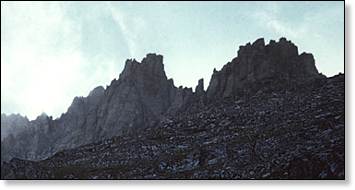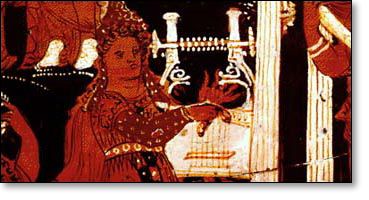Olympians (uh-LIM-pee-uns or oh-LIM-pee-uns). The supreme gods of the Greek pantheon, who were thought to dwell on the peaks of Mount Olympus or somewhere in the sky. High in the clouds, they lived in a marvelous palace and diverted themselves from time to time by interfering in the lives of the mortals below.
 The king of the Olympian gods was Zeus. He sat on a throne of Egyptian marble, inlaid with gold. A purple ram's fleece cushioned the seat. Queen Hera's throne was ivory. Over it hung a full moon. To the side of Hera sat Ares, the god of war. His throne, of burnished brass, had a cushion covered in human skin. The throne room, or council hall, was in the midst of the sumptuous palace, built for the Olympians by the Cyclopes, industrious one-eyed giants.
The king of the Olympian gods was Zeus. He sat on a throne of Egyptian marble, inlaid with gold. A purple ram's fleece cushioned the seat. Queen Hera's throne was ivory. Over it hung a full moon. To the side of Hera sat Ares, the god of war. His throne, of burnished brass, had a cushion covered in human skin. The throne room, or council hall, was in the midst of the sumptuous palace, built for the Olympians by the Cyclopes, industrious one-eyed giants.
 There were twelve supreme Olympians, although the precise configuration of the divine counsel convening on Mount Olympus was subject to change over time. At one point, for instance, Hestia, goddess of the hearth, was a member, but she grew tired of the godly bickering and gladly gave her place to the god of wine, Dionysus.
There were twelve supreme Olympians, although the precise configuration of the divine counsel convening on Mount Olympus was subject to change over time. At one point, for instance, Hestia, goddess of the hearth, was a member, but she grew tired of the godly bickering and gladly gave her place to the god of wine, Dionysus.
 Demeter's daughter Persephone was sometimes but not often considered to be one of the twelve. As Hades' wife, her proper throne was in the Underworld. Nor was the god of the dead, Hades himself, an Olympian, even though he was Zeus's brother. On the other hand, Zeus's other brother Poseidon shared the lofty heights of Olympus when he was not breasting the waves in his seaborne chariot. He is often depicted carrying a three-pronged spear, or trident, symbol of his power as god of the sea.
Demeter's daughter Persephone was sometimes but not often considered to be one of the twelve. As Hades' wife, her proper throne was in the Underworld. Nor was the god of the dead, Hades himself, an Olympian, even though he was Zeus's brother. On the other hand, Zeus's other brother Poseidon shared the lofty heights of Olympus when he was not breasting the waves in his seaborne chariot. He is often depicted carrying a three-pronged spear, or trident, symbol of his power as god of the sea.
 Others in the pantheon were Aphrodite, goddess of beauty, and her husband Hephaestus, master craftsman of the gods; Hermes, the Olympians' messenger, and Apollo, god of prophecy and healing. Athena often carries a spear because she is goddess not just of crafts but of the science of war as well. And Artemis the huntress is equipped with a bow.
Others in the pantheon were Aphrodite, goddess of beauty, and her husband Hephaestus, master craftsman of the gods; Hermes, the Olympians' messenger, and Apollo, god of prophecy and healing. Athena often carries a spear because she is goddess not just of crafts but of the science of war as well. And Artemis the huntress is equipped with a bow.
|





